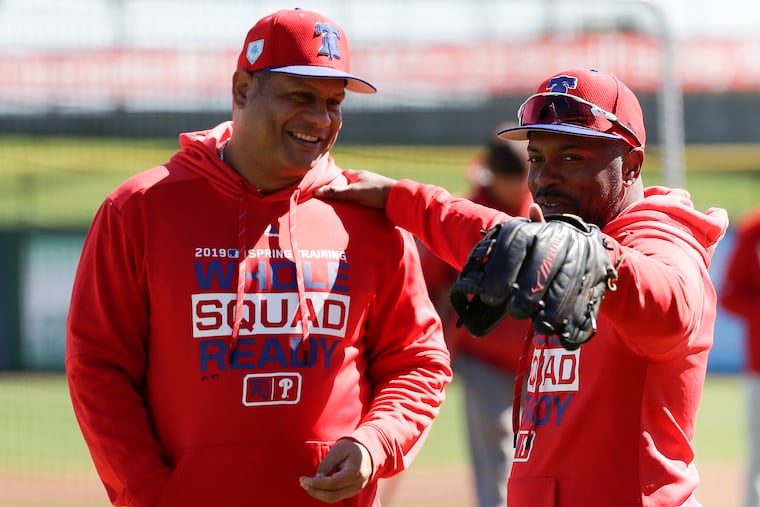Bobby Abreu’s HOF case is stronger than you might think. For the Phillies Wall of Fame, it is a no-brainer. | David Murphy
Does Bobby Abreu deserve to be in the hall of fame?

This is a column about Bobby Abreu, but maybe it is best to begin with Chase Utley.
Five years from now, Utley will make his first appearance on Major League Baseball’s Hall of Fame ballot, and the early indications suggest he’ll be regarded as a serious candidate. If you question whether that is an accurate summation of where things stand, simply Google his name and the words “Hall of Fame.” At the very least, the consensus seems to hold that he is an interesting case.
The argument for Utley centers largely on his peak, a six-year stretch from 2005 to 2009 when he was unquestionably the best offensive second baseman in the game. His numbers during those seasons speak for themselves: a .301 batting average, a .388 on-base percentage, a .535 slugging percentage, and an average of 29 home runs and 15 stolen bases per season.
It is a beautiful batting line, one that combines all of the tools demanded of a hitter, and thus appeals equally to evaluators of any age or mathematical persuasion.
It is also one that bears an indisputable similarity to the numbers that Abreu compiled during his eight-plus seasons with the Phillies, when the Venezuelan right fielder hit .305 with a .416 on-base percentage, a .513 slugging percentage, and averages of 22 home runs and 29 stolen bases per season.
If my impression of public opinion is correct, the pulses of a significant proportion of readers will have quickened upon reading those last two sentences.
At the very least, I feel quite secure in saying that the overarching narrative of post-strike Phillies history is one in which Abreu and Utley are positioned as a sort of yin and yang of the two-plus decades spanning the gap between the ’93 National League title and the present moment.
To many, there is no comparison between the two players, only contrast, the bridge between the eras in which they played suspended by a tension of opposites between one of the greatest Phillies who ever lived and one of the most frustrating, a tension born of the very nature of winning and losing itself. Gritty versus glossy, sacrifice versus self-preservation, mediocrity versus the extra mile.
I am not here to debate the merits of this equivalence, nor am I here to suggest that Utley’s HOF candidacy is an apples-to-apples comparison to the one that Abreu will submit when he appears on the ballot for the first time next year.
Utley spent more than a half a decade as one of the best hitter’s in the majors while playing at one of its most offensively starved positions, and any case for his inclusion among the game’s immortals depends heavily on that fact.
Abreu never finished a season with an offensive WAR that was higher than third among outfielders, playing as he did in an era that included Barry Bonds, Gary Sheffield, Vladamir Guerrero, Larry Walker, and Jim Edmonds, among others.
When I met up with Abreu in the hallway outside the Phillies clubhouse on Wednesday afternoon, he seemed surprised that somebody had decided that the Hall of Fame was even something worth discussing.
“I guess we’ll just have to wait and see what happens,” he said. “To even be there in the conversation, it makes you feel good about all of the things that you did in your career."
Mostly, Abreu seemed amused by the fact that he had even been out of the game long enough to gain his Hall of Fame eligibility.
Five days shy of 45 years old, he is still strong and healthy looking. The face is a little rounder, the tan a little more weathered, but in pinstripes and a red windbreaker, he still looks more like a player than a retiree in camp as a guest instructor.
Perhaps that shouldn’t come as a surprise, given the longevity and consistency that marked his career. He is one of 34 outfielders in MLB history to finish his career with 10,000-plus plate appearances. Among those players, he ranks eighth with a .395 OBP. Of the seven in front of him, only Bonds is not in the Hall.
“When I was playing, I was playing against Vladimir, he was already such a big talent,” Abreu said. "And all of the other outfielders: Larry Walker, Gary Sheffield ... so I guess that could be one of the reasons my name isn’t there. But I think now people are starting to see all of those numbers put together and what I did.”
Truth be told, Abreu’s proper place is probably in the Hall of Very Good. His offensive numbers track most closely to those of Bernie Williams and Luis Gonzalez, and neither gained enough votes to last longer than a year on the ballot.
But within a more local domain, there is no question that Abreu deserves enshrinement as an all-time great. This is his first year of eligibility for induction into the Phillies’ Wall of Fame, and I’d love to hear the argument that says he isn’t the most worthy of the current candidates.
There is a sentimental case to be made for Jim Fregosi, and an objective one for Scott Rolen. But from a holistic standpoint, Abreu should have both of them beat.
In that regard, it is heartening to see the organization integrating him back into the fold.
“It’s nice to come back and wear the uniform and be back on the field,” said Abreu, who is in his second season as a guest instructor. “And also to talk to the guys and offer what you know, and pass it to them, so they can be better players too.”
Abreu has always offered more than he gets credit for around these parts. A plaque among the Phillies greats would seem a proper recognition.